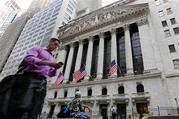- California Assembly OKs highest minimum wage in nation
- S. Korea unveils first graphic cigarette warnings
- US joins with South Korea, Japan in bid to deter North Korea
- LPGA golfer Chun In-gee finally back in action
- S. Korea won’t be top seed in final World Cup qualification round
- US men’s soccer misses 2nd straight Olympics
- US back on track in qualifying with 4-0 win over Guatemala
- High-intensity workout injuries spawn cottage industry
- CDC expands range of Zika mosquitoes into parts of Northeast
- Who knew? ‘The Walking Dead’ is helping families connect
US STOCKS REBOUND AS ANXIETY OVER BRITISH VOTE EASES
U.S. stock indexes mounted a broad comeback Tuesday as investors set aside their anxiety over Britain’s vote to leave the European Union and snapped up shares following a two-day rout.
Encouraging data on the U.S. economy and housing market helped put traders in a buying mood. The broad rally followed even bigger gains in Europe, which also bounced back from the steep losses triggered by Britain’s “leave” vote last Thursday.
Oil and gas companies led the rally as energy prices rose. Banks and other financial companies, which took the heaviest losses in the sell-off, also surged. Health care, consumer and technology stocks also notched gains. Bond prices fell, sending yields higher.
“We were due for a bounce heading into the morning; we had a couple of tough days there,” said Sean Lynch, co-head of global equity strategy at Wells Fargo Investment Institute. “Investors are stepping up and seeing some areas that may have been oversold the past couple of days and redeploying some of their cash.”
The Dow Jones industrial average gained 269.48 points, or 1.6 percent, to 17,409.72. The Standard & Poor’s 500 index rose 35.55 points, or 1.8 percent, to 2,036.09. The Nasdaq composite added 97.42 points, or 2.1 percent, to 4,691.87.
Despite the rebound, the three indexes remain on track to end June in the red. They’re also down for the year.
European benchmarks had an even better day than U.S. indexes. Britain’s FTSE 100 and France’s CAC 40 each gained 2.6 percent. Germany’s DAX added 1.9 percent.
The euro and the British pound recovered somewhat, though the pound remained near the 30-year lows it plunged to immediately following the British “leave” vote.
Uncertainty and anxiety over the economic fallout from Britain’s vote to leave the European Union had roiled global financial markets since Friday and prompted ratings agencies to slash their top-shelf credit rating for the U.K.
Investors appeared to shake off their some of their jitters Tuesday. British Prime Minister David Cameron signaled he might not trigger a clause setting in motion the U.K.’s exit from the EU before October.
In the U.S., investors got a batch of encouraging economic data to consider.
The Commerce Department raised its estimate of U.S. economic growth in the first three months of the year. Separately, a key gauge of home values showed U.S. home prices climbed in April, hitting record highs in several cities. In addition, the Conference Board said its measure of U.S. consumer confidence increased this month to the highest level since October.
“Obviously, the market isn’t very receptive to uncertainty, but in some ways this uncertainty is providing the possibility and the consideration that what happened in the U.K. isn’t necessarily reflective of, or an indicator of, a recession, especially here in the U.S. as well as globally,” said W. Janet Dougherty, a global investment specialist at J.P. Morgan Private Bank.
Pharmaceutical company Endo International surged 18.3 percent, the biggest gainer in the S&P 500 index. The stock added $2.50 to $16.19.
Xencor vaulted 32.1 percent after the drugmaker announced a partnership with Novartis to develop two cancer drugs. The stock rose $4.02 to $16.56.
Several energy companies also notched gains.
Southwestern Energy climbed $1.47, or 11.8 percent, to $13.89, while Devon Energy added $2.24, or 6.6 percent, to $35.99. Cabot Oil & Gas gained $1.93, or 8 percent, to $25.99.
Earlier in Asia, markets bounced back from early losses as leaders signaled they were ready to step in with support policies. Japan’s benchmark Nikkei 225 index climbed 0.1 percent, while South Korea’s Kospi added 0.5 percent.
Hong Kong’s Hang Seng Index was a laggard, losing 0.3 percent. It was dragged down by companies with high exposure to Europe, such as billionaire tycoon’s Li Ka-shing’s CK Hutchison Holdings, which has British retail, ports and telecom investments and fell 1.7 percent.
In currency markets, the pound recovered to $1.3343 from $1.3176 on Monday. The yen eased slightly against the dollar, though it was still hovering near its strongest level in two years. The dollar rose to 102.79 yen from 101.97 yen. The euro strengthened to $1.1049 from $1.1005.
Benchmark U.S. crude rose $1.52, or 3.3 percent, to close at $47.85 a barrel in New York. Brent crude, used to price international oils, gained $1.42, or 3 percent, to close at $48.58 a barrel in London.
In other energy trading, wholesale gasoline rose 3 cents to $1.51 a gallon. Heating oil added 4 cents to $1.47 a gallon. Natural gas gained 20 cents, or 7.4 percent, to $2.92 per 1,000 cubic feet.
Bond prices fell. The yield on the 10-year Treasury note rose to 1.46 percent from 1.44 late Monday.
In metals trading, gold fell $6.80 to $1,317.90 an ounce, silver rose 10 cents to $17.89 an ounce and copper added 5 cents to $2.18 a pound.













kelly
November 25, 2017 at 10:18 AM
Very nice and always successful.
This is a very good article.
I’m waiting for you the other article.
togelpelangi